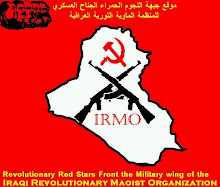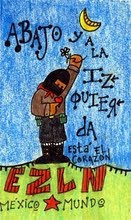Asia Times
October 16, 2009
Maoists go on pilgrimage in China
By Dhruba Adhikary
KATHMANDU - Nepal's top Maoist leader, Prachanda, included a visit to the town of Shaoshan in Hunan province while on a trip to China this week. This stopover at Mao Zedong's birthplace matches the one he made last year, as prime minister, in Germany - while en route to the United Nations headquarters in New York - to Trier, where Karl Marx was born.
Prachanda's desire to visit places where some of the world's greatest ideologues have surfaced derives from a deep-seated interest in original communist concepts, and in comparing them with present-day realities.
The party Prachanda currently heads, the Communist Party of Nepal (Maoist), has purist members who believe that in China communism was diluted by later-day leaders in their bid to take their country to modernity. Some of them also do not see any plausible reason to discredit the tumultuous 1966 to 1976 Cultural Revolution, and there are some others who criticize paramount leader Deng Xiaoping for deviating from the original path for the sake of the economic prosperity of a few.
Accompanying Prachanda was his mentor and senior colleague, Mohan Baidya "Kiran", for possible political discourse at the ideological level. Party spokesman and another prominent leader, Krishna Bahadur Mahara, conceded that the high-level delegation would seek to utilize the opportunity to understand first-hand the events, trends and achievements of China since it was born as the People's Republic of China in October 1949.
"There is a lot be learnt from the experiences of our northern neighbor," Prachanda told Asia Times Online on the eve of his tour. He is chairman of the party which won the largest number of seats - not an absolute majority though - in the National Assembly elections held in April 2008.
The assembly is now drawing up a new constitution to replace the interim one that aims at institutionalizing Nepal as a republic with a federal set-up. Maoist members in the assembly have been insisting that the country have an executive presidency and a multiparty system in which the main party leads the other parties and that there is no official opposition bench, like in countries with a Westminster system.
This means the Chinese model, but Maoist leaders are hesitant to publicly express their preferences. Nepal, since liberation from autocratic rule in 1951, has practiced only the model adopted in countries with a parliamentary democracy.
Prachanda has said phases in China span from insurgency and revolution to a great leap forward to prosperity - subjects in which his comrades-in-
Prachanda seems greatly fascinated by the observation of Chris Patten, the last British governor of Hong Kong at the time of its handover to China in 1997, in an article issued to coincide with China's October 1 anniversary celebrations, "Mao made China proud. Deng made it prosperous."
Prachanda's positive remarks about China were promptly reciprocated by a senior Chinese leader. China's top political advisor, Jia Qinglin, assured Prachanda that his visit would have a "positive and far-reaching impact on relations between the two countries as well as relations between the two parties".
Analysts see these initial gestures as an indicator of Beijing's eagerness to develop party-to-party ties. "It is indeed already assuming palpable significance,
This new scenario is emerging after a few ups and downs since Prachanda became prime minister in August 2008. He had then broken an unwritten tradition of Nepal's prime minister visiting India first, by flying to Beijing where Chinese leaders were taking part in the closing ceremony for the Beijing Summer Olympic Games. They expressed delight at Nepal's new prime minister visiting China within a week of his assumption of high office.
But the enthusiasm swiftly vanished once Prachanda told the media in Kathmandu that his "first political visit" would, after all, be to India. Several of Nepal's political pundits criticized Prachanda for being unnecessarily apologetic. "He lost goodwill from both sides - north and south," said former ambassador Acharya.
A chance to mend fences came in May. But Prachanda suddenly got entangled in a row over the sacking of the then-army chief, resulting in the cancelation of the visit to China at the 11th hour. One conspiracy theory making the rounds says New Delhi wanted to prevent Prachanda from signing a new peace and friendship treaty with China, the draft of which was earlier handed over to Nepal's prime minister by a visiting Chinese official in Kathmandu. "This remains a mystery," Prachanda told this correspondent without elaborating.
The entanglement led to Prachanda's resignation from the premiership, on May 4. The televised address he made to announce his resignation contained this acrimonious statement, "We are not ready to bow our head in front of foreign masters by ignoring the blood of tens of thousands of patriotic individuals.
Prachanda happened to be in Beijing at the time the Chinese Foreign Ministry expressed "strong dissatisfaction" over Indian Prime Minister Manmohan Singh's tour of the disputed Indian state of Arunachal Pradesh. New Delhi promptly issued a reaction rejecting the Chinese contentions.
Another area of Chinese concern has traditionally been Tibetan refugees in Nepal, who carry out a "Free Tibet" campaign and have street protests from time to time. While Nepal holds to the "One China" policy, as do many other countries, including the United States, its porous border with India has been a source of trouble for some time.
Yet the Chinese know that such protests were effectively curbed during Prachanda's tenure as prime minister. In the meantime, news has come from Washington that President Barack Obama has declined to meet the exiled Tibetan spiritual leader, the Dalai Lama, in view of Obama's scheduled visit to China next month. This American approach inevitably helps Nepali authorities to be more firm in their dealings with potential trouble-makers.
Contemporary Indian media reports reflect growing concern in New Delhi about a purported increase in Chinese influence in Nepal. Chinese diplomats, however, do not agree with this perception.
In a recent interview given to this correspondent, the Chinese ambassador, Qui Guohong, described such a statement as "groundless and baseless".
"Our friendly relations with Nepal are not targeted against any other country," he added, saying that China wanted stable relations with Nepal.
It is a widely-held view that unlike India, China does not meddle in Nepal's internal political process. And if one were to measure this aspect on a percentage point basis, according to Mahara, the Maoist party's international affairs unit chief, 90% of the blame would have to go to India and the remainder to China.
After all, how different are Nepali Maoists from Indian Maoists, also called Naxals, against whom New Delhi is determined to unleash its security forces with a view to wiping out terrorism? In responding to this question, Prachanda made it clear that workers of his party were distinctly different from Indian Maoists, despite a broad ideological approach.
"We are already a legitimate political force in Nepal - through a series of peace accords and an ongoing peace process witnessed by the UN," he said. Attempts to isolate us, he said, could be counter-productive, leading to a rapid spread of a violent movement all over South Asia.
Will renewed goodwill from China work to expand Prachanda's popular base in Nepal and make him capable of ousting the incumbent prime minister, who stands accused of effectively heading a puppet regime? Kathmandu's chattering classes believe it will.
Dhruba Adhikary is a Kathmandu-based journalist.
HOME:
http://www.groups.yahoo.com/group/MAOIST_REVOLUTION
Unified Communist Party Of Nepal(Maoist)
http://www.cpnmintl.org/
Philippine Revolution
http://www.philippinerevolution.net/
Revolution in South Asia - US based solidarity with Maoist Revolutionary forces
http://southasiarev.wordpress.com/
REVOLUTION http://www.rwor.org
Indian Revolution
http://www.bannedthought.net/
http://www.bannedthought.net/India/CPI-Maoist-Docs/index.htm
* Communist Party of India (MAOIST)
Communist Party of India(ML)Naxalbari
http://www.thenaxalbari.blogspot.com/
REVOLUTIONARY COMMUNIST PARTY (CANADA)
http://www.pcr-rcp.ca ENGLISH
http://www.pcr-rcp.ca/fr/ FRENCH (Fran�ais)
http://www.lionesto.net/
Italian section:
Maoist Communist Party Of Italy
http://www.prolcom.altervista.org
Guerre Popolari (People's War)
http://www.prolcom.altervista.org/guerre_popolari.htm
Maoist Communist Party of Italy led - Red Block Youth blog
http://www.redblock-it.blogspot.com
Selected Works of Mao Tse-tung
http://www.marxists.org/reference/archive/mao/index.htm
http://www.marxists.org/reference/archive/mao/selected-works/index.htm
COMMUNIST PARTY OF IRAN(MARXIST_LENINIST_MAOIST)
http://www.sarbedaran.org/ Farsi
http://www.sarbedaran.org/language/index.htm English
Communist(Maoist)Party of Afghanistan (English)
http://www.sholajawid.org/
A World To Win AND R.I.M.
http://www.aworldtowin.org
A World to Win News Service, direct to your mail Box: http://uk.groups.yahoo.com/group/AWorldToWinNewsService/
To subscribe, click: aworldtowinnewsservice-subscribe@yahoogroups.com
Servicio Noticioso Un Mundo Que Ganar (A World to Win News Service - Spanish)
http://es.groups.yahoo.com/group/ServicioNoticioso_UMQG/
Change settings via the Web (Yahoo! ID required)
Change settings via email: Switch delivery to Daily Digest | Switch format to Traditional
Visit Your Group | Yahoo! Groups Terms of Use | Unsubscribe




